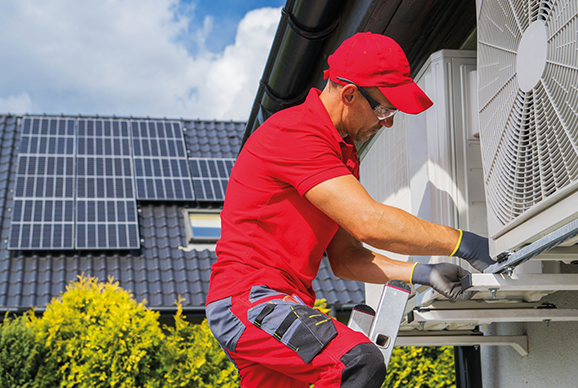Meeting the growing demand for heat pumps
- Davie Robb
- Dec 15, 2023
- 4 min read
Our guest columnist Daikin outlines the free training available for air source heat pump installation – and the skills that electricians will need to become experts in the technology

Change is coming to Scotland and the demand for heat pump installers is growing by the day. But are we equipped to handle it?
According to MCS, 18,879 domestic air source heat pumps have been installed in Scotland to date, at a rate of around 3,000-4,000 per year. At present, it’s estimated there are only around 200 installers trained to carry out this work in Scotland, so there’s definitely a skills gap that needs filling.
The demand for heat pump installers is only set to intensify over the next decade, with gas boilers no longer allowed in new builds in Scotland after April 2024.
There’s an urgent need to grow, reskill and train our existing workforce to handle this increased demand, and at Daikin we’re focusing on recruiting more installers and offering the training they need to move away from fossil fuel boilers to renewable products.
An integral part will be played by electrical contractors working with heating installers, so let’s take a look at the skills needed to help Scotland make the switch to green heating.
“There’s no doubt that the demand for heat pumps is here and now is the time to start thinking about renewable products and how they can help your customers”
Technical know-how required
A heat pump installation differs from a traditional boiler in several ways. Fora start, a boiler installer must be Gas Safe qualified, whereas a heat pump installer isn’t.
Heat pump installers are required to be competent, e.g. covered by the LCL Awards Level 3 Award in the Installation and Maintenance of Heat Pump Systems (non-refrigerant circuits) combined with manufacturer-specific product training.
These qualifications can take an installer to a high level of competence. However, to go a further step and repair any issues required in the refrigeration circuit, e.g. changing the compressor, F-Gas qualification and brazing skills are required. Most heating installers work with an electrical contractor to ensure this part of the installation is correct.
A heat pump also requires an outdoor unit to be installed in a suitable location connected to a hot water cylinder inside the property – usually in the airing cupboard – with a tank required for a system boiler. The pipework and controls need to be set up as per the design and are broadly similar, although pipe sizing needs careful checking.
As the flow temperature is generally lower compared to boilers, radiators or heat emitters are usually larger for heat pumps and again need to be checked and the design followed for the individual property.
In terms of skills, installers will need to locate the outdoor unit discreetly so it’s positioned correctly for airflow and maintenance access and meets the manufacturer’s spacing requirements. Permitted development rights will also need consideration and pipework and controls wiring should also be neat, discreet and to the manufacturer’s recommendations.
The installer will need to be comfortable explaining the system to the homeowner and able to explain the difference between a heat pump and gas boiler, e.g. lower flow temperatures and letting the unit run for longer, rather than stopping and starting it.
It’s also vital to ensure the system is set up correctly to ensure efficient operation.
The installer will need to explain the setting and operation to the homeowner, as well as be able to set the system up to meet their specific requirements.
“A heat pump installation differs from a traditional boiler in several ways. For a start, a boiler installer must be Gas Safe qualified, whereas a heat pump installer isn’t”
Training and incentives available
Training courses don’t have to be time-consuming or expensive. Daikin runs a series of one-day installation courses across each of its product groups, offering a wealth of training to anyone looking to get into heat pumps.
Training is free for customers, so there’s no investment required. And Daikin is currently preparing to extend its training reach in Scotland, with plans to service the main population areas and train more installers locally.
Daikin is also offering fantastic incentives for installers too, with apayment of £250 for each air source heat pump and hybrid system registered with Daikin under the Home Energy Scotland Grant and Loan Scheme.
The same scheme offers generous grant funding of up to £7,500 to help customers finance the installation, or £9,000 if the household qualifies for the rural uplift. The remainder of funding requested can be taken up as an optional interest-free loan supplied by the Scottish Government.
Strike while the iron’s hot
There’s no doubt that the demand for heat pumps is here and now is the time to start thinking about renewable products and how they can help your customers.
Heat pumps provide both heating and cooling, can help save money and – most importantly of all – help to reduce the nation’s carbon footprint.
This is your opportunity to differentiate your business and take a step into the growing renewables sector. So what are you waiting for?
Find out more
Daikin offers a wide range of air source heat pumps to fit most applications. Find out more about its heat pump training and installer incentives.



















Comments